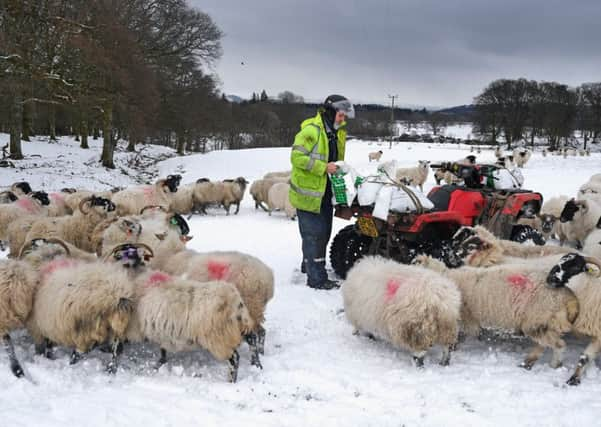Stephen Jardine: The '˜heroes' Scotland fails to appreciate


It’s a strange life being a farmer. You battle the elements every day of the year to keep the country fed in exchange for very little thanks. Of course, according to myth and legend, they don’t need our gratitude because they have got our cash. When they are not out in the fields they are literally rolling in money, so the story goes. Except, they are not.
The Scottish Government’s annual Farm Business Survey showed median income last year was £12,600 or about £8,000 less than the Scottish average. That wouldn’t be so bad if they were sitting in a warm shop or a cosy office but instead of that they face the worst weather Scotland can muster. The past ten days have been a vivid reminder of that.
Advertisement
Hide AdAdvertisement
Hide AdIn the city, our dislocation from rural life is now far advanced. Farmers seem physically and socially remote from us. It took the Beast from the East to change that.
From rescuing a woman going into labour at a cottage near Kinross to clearing country roads to free trapped villagers, farmers played a vital role in keeping the countryside moving during the big blizzard. Many remote communities never saw a gritter or a snow plough throughout the storm. Instead they relied on local farmers to help them make it through the ice and snow.
Social media featured posts from people in the countryside calling them ‘legends’ and ‘heroes’. That sort of appreciation normally comes with a reward but for farmers it was simply yet more hardship.
As well as digging local communities out from the snow, they had to try to locate, feed and water livestock caught in the eye of the storm.
One farmer posted images of dead sheep frozen solid in giant drifts. Others had to get up in freezing darkness for morning milking, only to have to pour the results away when delivery tankers were unable to make it along frozen farm roads.
It was only when milk supplies started to dry up in shops and supermarkets that the average consumer started to think about what might be happening in the countryside. Even then it was more irritation about the impact on our endless appetite for semi-skimmed lattes than it was compassion and consideration for those who really did face the worst of the recent weather.
If the big freeze showed us anything, it was how fragile our food chain is and how little the big retailers care. It doesn’t take much to empty the shelves and the only reaction from major shops was to ration supplies. Deliveroo even slapped a a surcharge on each order to incentivise delivery staff to ignore warnings and brave the snow. Green MSP Ross Greer called the move “exploitative”. Others called it “deplorable”.
While that was happening, farmers were out in sub-zero temperatures checking on pregnant sheep that will be lambing in just a few weeks’ time. That is one delivery that really cannot wait.
Advertisement
Hide AdAdvertisement
Hide AdWhile the rest of us were heeding the warnings not to travel and staying warm inside with a favourite boxed set and a surcharged takeaway, our farmers never, ever get a snow day.
Choosing that life means enduring hard work and bad weather in remote places but it also comes with an acceptance that you are part of a wider community.
That means not just feeding the public but also helping in any way possible when times are tough. So with milk now back on the shelves, perhaps it’s time for the rest of us to do our bit. This weekend that could mean a trip to a farm shop or farmers market or buying online from a farm business. At the very least it could simply be searching out, choosing and buying Scottish farmed produce in the shops. It’s a simple way of saying thank you to people who right now deserve our gratitude more than most.
